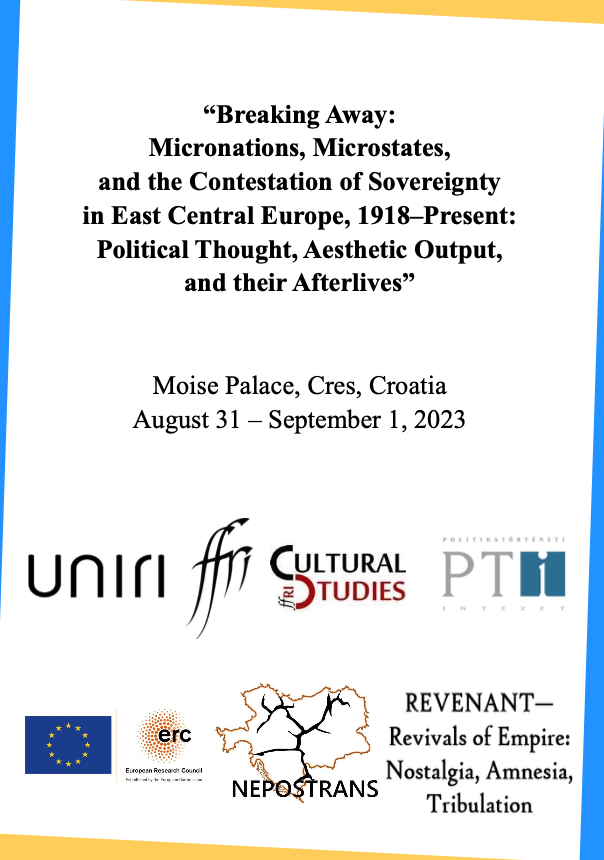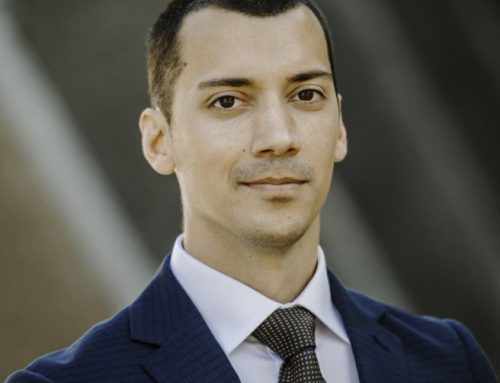Breaking Away: Micronations, Microstates, and the Contestation of Sovereignty in East Central Europe, 1918–Present
INTERNATIONAL CONFERENCE
31 August – 02 September 2023
Venue: Moise Palace, Zagrad 6, 51557, Cres, Croatia
Conference Organized under the Auspices and with the Financial Support of
ERC Consolidator Grant Project “NEPOSTRANS: Negotiating Post-Imperial Transitions” (Grant No. 772264, 2018–2023), hosted at the Institute of Political History, Budapest, Hungary and ERC Consolidator Grant Project “REVENANT: Revivals of Empire: Nostalgia, Amnesia, Tribulation” (Grant No. 101002908, 2022–2027), hosted at the University of Rijeka, Rijeka, Croatia.

Recent historiographical turns and trends have led to a renewed scholarly interest in empires, whether through the comparative study of empires themselves or through new ways of looking at post-imperial and inter-imperial transitions, legacies, and memories. This conference responds to this recent wave of interest in such conjunctures by tackling the theme of imperial collapse, zooming in on multiethnic, inter-imperial borderlands as ‘sites’ of post-imperial contestations of sovereignty.
Across collapsing empires’ borderlands in East Central Europe, microstates and micronations sprung up, whereby local communities, often led by a revolutionary intelligentsia, sought not only to break away from imperial structures, but also to redefine the notions of a political community and participation more broadly. While typically short-lived and rather unsuccessful, the comparison of their locations, their leaders’ and officials’ trajectories—together with the analysis of their political thinking and aesthetic output—can significantly contribute to diversify current understandings of the ‘long First World War’ in scholarship, as well as the complex local stakes and political thinking on overcoming the various tenets of the imperial.
The century since the First World War has witnessed the consolidation of the nation-state as a globally hegemonic political formation, even as imperial legacies and continuities persist. Nor have micronations disappeared. If the microstates and micronations of the early twentieth century were expressions of both imperial fragmentation and ambition, those of today reflect a comparable, if distinct, political logic: the paradoxical yoking of a liberal political language of sovereignty and self-determination—which presupposes statehood—to a neoliberal economic logic of deregulation that vilifies the state, and, by extension, politics as such.
This conference aims to address these issues from an interdisciplinary and transdisciplinary perspective by engaging historians, anthropologists, memory studies scholars, literary scholars, art historians, political scientists, and scholars from adjacent fields in a joint conversation on these territories, communities, intellectual traditions, cultural products, and their prominent legacies.
Scientific-Organizational Committee
Lucija Balikić (Central European University, Budapest/Vienna)
Cody J. Inglis (Central European University Budapest/Vienna)
Kevin Kenjar (University of Rijeka)
Stefan Gužvica (Institute for Philosophy and Social Theory, University of Belgrade)
Ivan Jeličić (University of Rijeka)
Emanuela Erasmus (University of Rijeka), Organizational Secretary and Coordinator
UNIRI The Moise Palace: Cres Island
An education center of the University of Rijeka. A five-hundred-year-old patrician townhouse and the largest Renaissance palace on the Croatian islands. A venue and forum for various scientific and research activities, it welcomes visiting academics, students and scholars.





